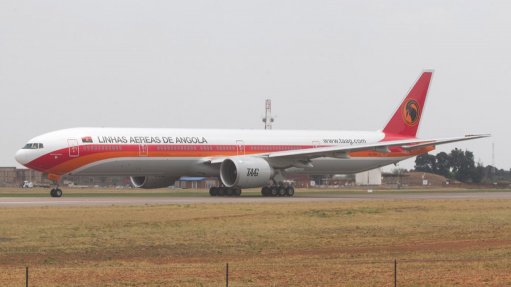
A Boeing 777 in the colours of Angolan airline TAAG
Photo by: Creamer Media
US aerospace and defence giant Boeing has reported that its revenues for the first quarter this year (1Q20) were 26% lower than in the same period last year (1Q19). The 1Q20 revenues were just under $16.91-billion as against the 1Q19 figure of just under $22.92-billion.
Using Generally Accepted Accountancy Principles, in 1Q20 the group suffered a loss from operations of just over $1.35-billion, in sharp contrast to earnings of $2.35-billion during 1Q19. The operating margin was –8%; in 1Q19 it had been +10.3%. It endured a net loss of $641-million, in comparison to net earnings of fractionally under $2.15-billion during the same period last year. Boeing reported a loss a share for 1Q20 of $1.11, as against earnings a share of $3.75 for 1Q19.
Operating cash flow was –$4.3-billion in 1Q20, in contrast to +$2.79-billion in 1Q19. The group’s total cash and marketable securities came to $15.5-billion at the end of 1Q20, significantly up on the figure of $10-billion at the end of the fourth (not first) quarter of last year (4Q19). This, however, was mainly owing to the company’s increased debt balance. Boeing’s total consolidated debt at the end of 1Q20 was $38.9-billion, in comparison to $27.3-billion at the end of 4Q19.
Boeing’s order backlog was worth $439-billion. This backlog included orders for more than 5 000 airliners and freighter aircraft.
“The Covid-19 pandemic is affecting every aspect of our business, including airline customer demand, production continuity and supply chain stability,” stated Boeing president and CEO David Calhoun. “Our primary focus is the health and safety of our people and communities while we take tough but necessary action to navigate this unprecedented health crisis and adapt for a changed marketplace.”
Boeing expected that the pandemic would have a “significant” effect on the demand for new airliners and freighter aircraft. Airlines would likely postpone orders for new aeroplanes, which would slow delivery rates. They would also delay optional maintenance of their aircraft.
Consequently, Boeing was reducing the production rates of its commercial aircraft, among other measures to meet the new market conditions. The group had also announced leadership changes and an organisational restructuring. Overall staffing levels would be reduced through a voluntary redundancy programme. Additional actions regarding the workforce will be taken, as required. The company was also, in the words of its press release, “actively exploring all of the available options” to be able to access additional liquidity.
“While Covid-19 is adding unprecedented pressure to our business, we remain confident in our long term future,” said Calhoun. “We continue to support our defence customers in their critical national security missions. We are progressing toward the safe return to service of the 737 MAX [airliner], and we are driving safety, quality and operational excellence into all that we do every day. Air travel has always been resilient, our portfolio of products and technology is well positioned, and we are confident we will emerge from the crisis and thrive again as a leader of our industry.”